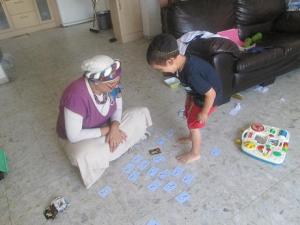I can hardly believe it’s already been a year since Yirmiyahu was born. So much has happened and time has gone so fast, and at the same time, I wonder how a year has already gone by?
It’s been an intense year filled with many challenges, the likes of which I hope I never have to go through again. But as far as Yirmiyahu himself, he has been a bundle of sweetness that has brought untold joy to us all.
For my readers, what did you think when I shared that we had received the diagnosis of Trisomy 21 after Yirmiyahu was born? Did you feel sorry for us, flinch at our bad luck and feel we deserved consolation?
I didn’t.
Though it seems most parents are initially devastated by the diagnosis, I wasn’t. One reason for this is that I didn’t accept for even for one second what the doctors told me to be the final word, as a sentence for what our baby’s life would look like. I knew that they couldn’t predict his future, despite their solemn faces as they delivered the news and told me all the things he’d never be able to do, all the problems he’d have, all the things they were so sure that they knew. I knew that this baby would have his own journey, just like each of our other children.
There was so much they didn’t tell me – I imagine that every year the list of things that they didn’t tell me will grow. They didn’t tell me how our hearts would open wider and become more understanding and accepting of people and their challenges. They didn’t tell us how our paradigm of the world would shift. They didn’t tell us how much excitement we’d feel over every step of his development – his first smile, when he rolled over, sat, supported himself on both knees, held a bottle, waved goodbye, said ‘mama’ to me ….
They told us he’d be mentally retarded, and the social worker reassured us by adding that kids with Down syndrome love to hug and kiss people and don’t know they’re different. This supposed consolation was worse than the doctors’ gloominess – this is what I had to look forward to? None of them told us about the sparkle of intelligence and curiosity in his eyes or the depth of love in his heart. They didn’t tell us how much he’d be able to learn, or stress how critical to his development our emotional investment in him would be. They didn’t tell us about the impressive accomplishments of so many people with Down syndrome, things that would give parents so much encouragement and hope rather than fill them with discouragement and despair. And they could never have told us how lucky we were to have this wonderful child become part of our family. They couldn’t tell us what they didn’t know.
A baby with Down syndrome has some differences from a typical baby. And that’s okay. It’s okay to be different. We’re all different in some ways, and part of our growth as human beings is to widen the circles of those that we accept and include in our lives, even when they don’t look or act just like us. But a baby with any kind of disability is still much more alike than different from all other babies. They thrive on our love and acceptance and appreciation. They have futures that can’t be predicted in advance regardless of their diagnosis or lack of diagnosis. The future is open to us all and it’s up to each of us to make the most of it. The doctors forget that. But we as parents know better.
There are many milestones ahead of us. Crawling, walking, talking, reading. There will be times of struggle and worry, times we doubt ourselves and times we are afraid for his future. Like with all of our children.
I am so happy and grateful every single day that Yirmiyahu is part of our family. As he is. Because as he is, is just perfect.
Happy birthday, Yirmiyahu!
Avivah
